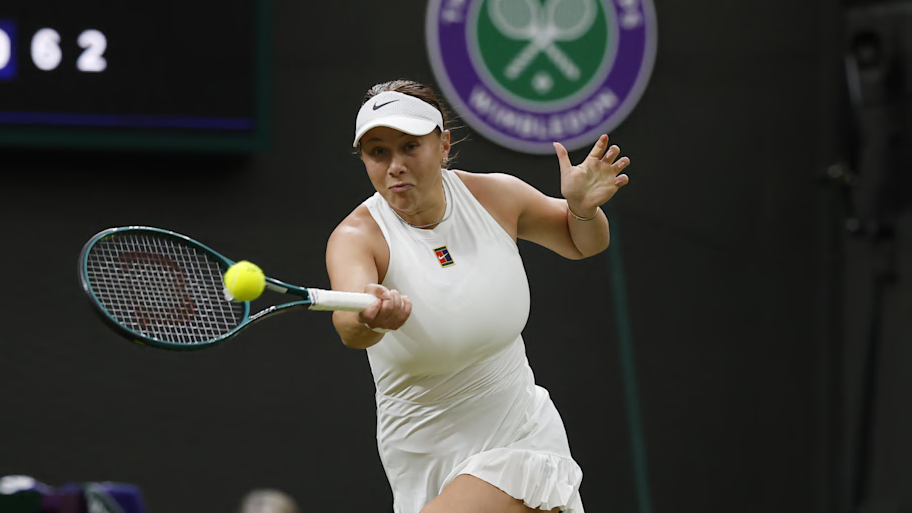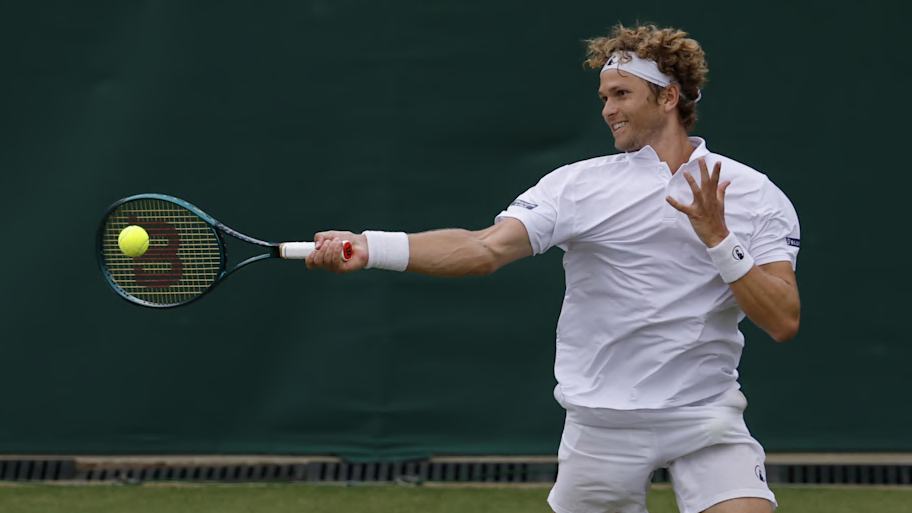
• Your midterm grades from Wimbledon are here.
• Andy and I are doing “Quick Served” podcasts every day of Wimbledon. Here's the YouTube landing page:
Onward …
I know you and Andy talked about it on the [Served] Re-Draw podcast (which was hilarious!) but please say more about WHY you think there were so many upsets in the first week!
Bryan
• Like many trends, it owes to a combination of factors. Some of it is simple probability. Tennis no longer has the outliers of Serena Williams, Roger Federer and Rafael Nadal (and Andy Murray). Remove them from the equation and, inevitably, there is more parity. More parity means less predictability and more variance.
Then, add grass. Not only is it an unusual surface that rewards a certain kind of player, but it also punishes another. It is also the least common surface so there is very little predictive value in results. Add the best-of–five match format. Add the rules of mere probability. (Sometimes the roulette ball lands on neither black nor red, but green!)
An additional pet theory, one that is going to sound harsher than intended: There are too many players—eyes pivot to Denmark—who give the top five players a good battle, but capitulate way too easily against lower-ranked opponents. Great that you get up to play against the giants. But it’s also a skill to get past the No. 40 to No. 70 opponents.
Add all this together, and, yeah, Wimbledon will have a draw punctuated with upsets and results that belie conventional wisdom.
I wonder if escaping the parent-as-coach model is good at any cost. Of course, the best former college player (Shelton) has his dad as coach…
@TennisInthePar1
• I’m not entirely sure what this refers to. But it raises a point I think about a lot. What works for Player X doesn’t work for Player Y. And vice versa. And hard, fast views and rules on tennis dynamics and decision making don’t really work.
There are ample examples of parents coaching children, contaminating both relationships. But then here comes Oracene Williams, Bryan Shelton and Coco Gauff’s parents. Caroline Wozniacki hardly seemed to suffer for having her dad in the coaching ranks. (Going further back, neither did Monica Seles and her dad nor Jimmy Connors and his mom.)
An adjacent point: It’s easy to see how a player dating a coach is problematic and fraught. Elena Rybakina is a current—perhaps extreme—example. But hardly the only one. Yet, you have Petra Kvitová marrying her coach, and both Belinda Bencic and Ons Jabeur marrying their fitness trainers. To each their own.
Jon:
A few years ago I had the chance to meet August Holmgren through the challengers I’m involved with. I’ve never talked with any player, no matter how wide-ranging their interests, about experimental theater or existentialism, at least not until I met Augie. And that he had acted in those plays, and was planning to pursue a career in theatre, his undergraduate major at USD (among many other things he planned), was just another first.
Of course, he was and is a phenomenally dedicated tennis player, plus obviously a terrific young man and human being. But honestly my brain, as opposed to my heart, wouldn’t have pegged him as someone who would ever reach the third round of a major. Only in a movie about tennis, in which August would be the best-tennis-playing actor ever to appear on screen. Still betting on that to happen.
Well, today the dream came true, in a script so unlikely that you couldn't make it up, including the qualifying escape. Hard work paying off. Dreams coming true. The right match at the right time. All the things that seem corny except, sometimes in sport. That’s why we watch, why we root. It was a Wimbledon moment for all time.
All best,
Leif
• Love that. Thanks so much. Here’s more thanks to Michael Lewis. I met Holmgren’s dad briefly the other day. He was in search of Centre Court seats so that he could watch ... Ollie Tarvet, who, like August, played at the University of San Diego. A day later, his father was crying as August won a fifth-set super tiebreak to reach the third round.
These snapshots—and your communiqué—reinforce a point I’ve been thinking about a lot this week: Every player comes from somewhere. Every player has a story. Every player has hopes, aspirations and challenges.

Hey Jon,
I was thinking today, there seems to have been a different ladies champ at Wimbledon for several consecutive years. I looked it up, and since Serena won in 2016, there have been no repeat winners. Off of memory, I’m pretty confident that’s the longest active streak of all the majors for the WTA (Iga [Świątek] has won the French multiple times since 2016, Aryna [Sabalenka] at the Aussie, Naomi [Osaka] at the U.S. Open). I wonder how long this streak will last. Only Rybakina or [Barbora Krejčíková] can break it this year. I also wonder if it’s the longest such streak of the open era (on both tours).
Best,
L.T. (Toronto)
• You are correct. We are going to have a new Wimbledon women’s champion for the ninth consecutive year. And three years running, the women’s champion (Rybakina, Markéta Vondroušová and Krejčíková) has not been among the top 10 seeds. Some of this is parity. Some of this is the quirkiness of grass, which—for all the bleating surface homogenization—is different underfoot from everything else. Some of this is simple math/probability, no? You have 128 players. They are all very good. There are injuries. There are matchups. It stands to reason that repeat champions will be few and far between, no?
Sharing this a little late in the tournament but in keeping with your “brutal sport is tennis” montage. Consider qualifier Carson Branstine. Her first qualifying match was against the top seed and recent French Open semifinalist. She pulled off the upset and was rewarded with a date against a fellow Canadian and major winner. She survived that, too, and then rallied from a set down to qualify. Her reward: a first round matchup against the world’s best player. Geez, that’s one tough stretch of four matches just to lose in the first round.
There may be bad matchups for certain players but there’s no lack of depth in the game.
Jim Barber, Atlanta
• On Branstine and the “brutal sport” theme: Earlier this year, down to $26 in her bank account, she was driving for Uber Eats to sustain her tennis career.
Biggest upset? Sometimes I wonder if you actually watch tennis. [Laura] Siegemund is one of the most dangerous unseeded players. This is absolutely not a shock against [Madison] Keys who is always shaky at best.
• Disagreement is a cornerstone of civilization. It makes the world spin. It makes for life’s rich pageant. But when did civility become an opt-in? Sometimes I wonder if you actually watch tennis. Why make a conscious choice to be a troll and make social media a burbling cesspool?
Keys versus Siegemund? This match pitted a recent major champion and a formidable player on grass against an opponent with a career Wimbledon record of 2–5. This pitted a 30-year-old against a 37-year-old. Keys was a –750 favorite, giving her an 88.24% probability of winning. (For comparison, Coco Gauff was a -525 bet to beat Dayana Yastremska in Round 1.)
Again, if you saw this result coming, congrats. You rock. If you didn’t think it was a big upset, cool. Make your case. Or don’t and simply disagree. But why get personal and be nasty about it?
Instead of lucky losers:
Double bouncers?
Lucky ducks?
Quantifiers? (Instead of qualifiers, these enter to meet the quantity of players required)
Second chancers?
Second servers?
Chosen ones?
William T.
• For backstory, Márton Fucsovics—who is lovely by the way—came on our Tennis Channel show and, unsolicited, playfully took issue with the term “lucky loser.”
Aside: What a wild event for this phylum. Canadian teen Victoria Mboko lost in qualifying, made the main draw when a player withdrew and won a round. Solana Sierra did likewise and reached the fourth round (including a takedown of Katie Boulter). Fucsovics won a pair of matches, including a five-set defeat of Gaël Monfils, and surely won’t have to qualify for his next major.
Anyway, yes, “lucky loser” scans awfully uncharitable. Of those choices, I vote for “double bouncer?”
ENJOY THE CLOSE, EVERYONE
More Wimbledon on Sports Illustrated
This article was originally published on www.si.com as Tennis Mailbag: Wimbledon Upsets, Breakouts and Unlikely Runs.







